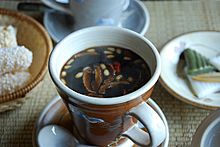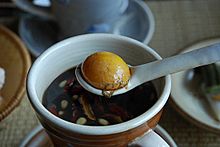Ssanghwa-tang facts for kids
|
Ssanghwa-tang with an egg yolk
|
|
| Type | Traditional Korean tea |
|---|---|
| Country of origin | China |
| Colour | Deep brown |
| Flavour | Slightly bitter |
| Ingredients | White woodland peony root, Rehmannia root, Mongolian milkvetch root, Korean angelica root, lovage root, Chinese cinnamon bark, Chinese liquorice |
| Korean name | |
| Hangul |
쌍화탕
|
|---|---|
| Hanja |
雙和湯
|
| Revised Romanization | ssanghwa-tang |
| McCune–Reischauer | ssanghwa-t'ang |
| IPA | [s͈aŋ.ɦwa.tʰaŋ] |
| Hangul |
쌍화차
|
| Hanja |
雙和茶
|
| Revised Romanization | ssanghwa-cha |
| McCune–Reischauer | ssanghwa-t'cha |
| IPA | [s͈aŋ.ɦwa.tɕʰa] |
Ssanghwa-tang (쌍화탕; 雙和湯) or ssanghwa-cha (쌍화차; 雙和茶) is a special traditional Korean tea. It has a deep brown color and a slightly bitter taste. For a long time, people in Korea have enjoyed this tea. It is known as one of the most popular "medical teas" in Korea.
Ssanghwa-tang: A Special Korean Tea
This tea is made by boiling down different herbs. These herbs have been used for a very long time. They are believed to help keep people healthy. Today, many people buy Ssanghwa-tang already made. This makes it easy to enjoy.
What's in Ssanghwa-tang?
Ssanghwa-tang gets its special taste from several dried roots and barks. These are some of the main ingredients:
- White woodland peony root (백작약; 白芍藥; baekjagyak)
- Rehmannia root (숙지황; 熟地黃; sukjihwang)
- Mongolian milkvetch root (황기; 黃芪; hwanggi)
- Korean angelica root (당귀; 當歸; danggwi)
- Lovage root (천궁; 川芎; cheongung)
- Chinese cinnamon bark (계피; 桂皮; gyepi)
- Chinese liquorice (감초; 甘草; gamcho)
These ingredients are boiled together to create the unique flavor and properties of Ssanghwa-tang.
What is Ssanghwa-tang Used For?
In the past, during the Joseon Dynasty in Korea, people often drank Ssanghwa-tang in the morning and evening. It was seen as a way to support their health.
If you are thinking about trying Ssanghwa-tang, especially if you have any health conditions, it's always a good idea to talk to a doctor or a pharmacist first. They can tell you if it's right for you.



